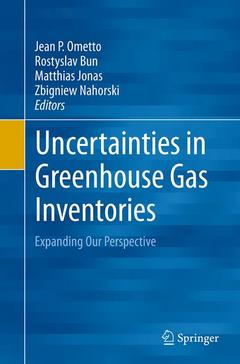Description
Uncertainties in Greenhouse Gas Inventories, Softcover reprint of the original 1st ed. 2015
Expanding Our Perspective
Coordinators: Ometto Jean P., Bun Rostyslav, Jonas Matthias, Nahorski Zbigniew
Language: English
Subjects for Uncertainties in Greenhouse Gas Inventories:
Publication date: 10-2016
Support: Print on demand
Publication date: 05-2015
240 p. · 15.5x23.5 cm · Hardback
Description
/li>Contents
/li>Biography
/li>Comment
/li>
Presents 16 key papers on uncertainty in greenhouse gas emissions and their inventories
Enhances understanding of dealing with uncertainty across spatial, temporal and thematic scales
Strengthens national inventories from an uncertainty perspective and their usefulness under a compliance and/or global monitoring and reporting framework
Shows the challenges and benefits of including inventory uncertainty in policy analysis
Written by top experts in the field
These books may interest you

Creating Low Carbon Cities 137.14 €

Creating Low Carbon Cities 137.14 €


